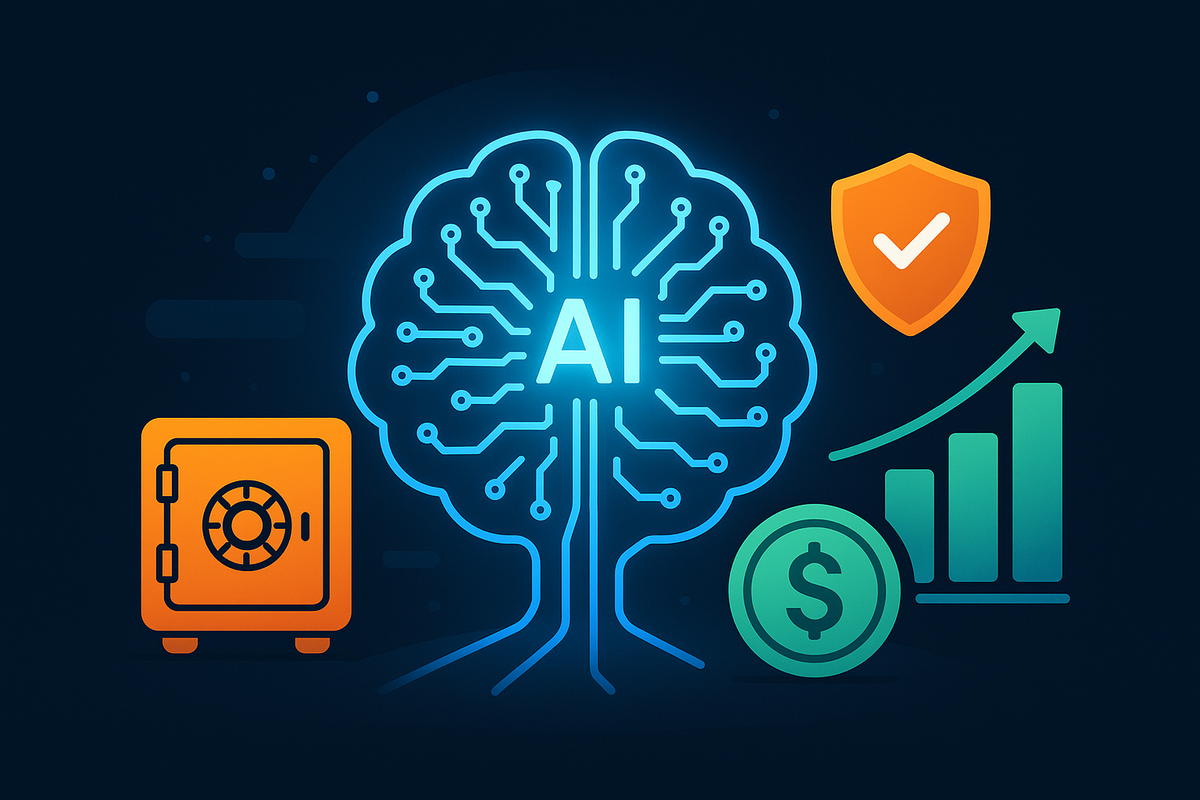AI Agents in Finance: Applications, Examples and Usecases
Explore how AI agents are transforming finance by enhancing fraud detection, risk management, and customer service while overcoming challenges.

AI agents are revolutionizing finance by automating tasks, analyzing data, and improving decision-making. Here's a quick overview of their key applications:
- Fraud Detection: AI identifies suspicious transactions in real time, reducing false positives and enhancing security.
- Risk Management: Real-time market analysis helps predict and mitigate financial risks.
- AI-Powered Trading: Algorithms execute trades efficiently, analyzing market data and trends without emotional bias.
- Payment & Loan Processing: Speeds up approvals and expands access to financial services.
Key Examples:
- Mastercard uses AI to process 125 billion transactions yearly, doubling fraud detection rates.
- JPMorgan's COiN platform reviews contracts in seconds, saving 360,000 hours annually.
- Wealthfront offers AI-driven financial advice, tailoring investment portfolios to individual goals.
Quick Benefits:
- Saves time and costs (e.g., $447 billion savings predicted for banks by 2023).
- Improves accuracy and reduces human error.
- Enhances customer service with 24/7 operations.
While AI offers efficiency and insights, challenges like data security and algorithmic bias remain. As finance evolves, mastering AI tools is becoming essential for professionals.
Main Uses of AI Agents in Finance
Detecting and Stopping Fraud
AI agents are changing the game in fraud detection by analyzing transaction data in real time. Using advanced machine learning models like graph neural networks, they identify patterns that might otherwise go unnoticed.
"AI fraud agents enhance fraud detection by swiftly identifying suspicious activities, processing large volumes of data in real time, and reducing false positives." - Inscribe
These tools can perform web presence reviews in less than 30 seconds - far faster than the traditional 10–30 minutes. This speed not only boosts efficiency but also helps financial institutions handle more transactions without compromising security. Beyond fraud detection, AI plays a key role in managing financial risks with real-time insights.
Managing Financial Risk
AI agents help financial institutions stay ahead of potential risks by analyzing market trends and multiple data streams simultaneously. This allows for real-time insights that support better decision-making.
Key features of AI risk management tools include:
- Real-time analysis of market conditions
- Automated reporting processes
- Scenario simulations for better predictions
- Predictive models to identify risks early
AI-Powered Trading
AI has become a cornerstone of modern trading systems, enabling trades to be executed with incredible accuracy. By continuously analyzing market data, news, and even social media sentiment, these systems eliminate emotional bias, leading to smarter trading strategies.
Looking ahead, AI is expected to save almost $1 billion in operational costs and cut digital onboarding times by 29 million hours by 2028. This efficiency allows trading firms to shift focus from routine tasks to refining their strategies.
Payment and Loan Processing
AI agents are also reshaping how payments and loans are processed. They can detect subtle patterns in payment behavior, enabling the approval of loans while helping borrowers plan repayments using a student loan payment calculator, all while upholding strong risk management practices.
Current Examples in Finance
Mastercard's Fraud Prevention System

Mastercard has taken fraud detection to the next level with an AI-powered system that processes a staggering 125 billion transactions every year. Their Decision Intelligence Pro model uses generative AI and graph technology to pinpoint compromised payment cards with impressive precision.
Here’s what makes the system stand out:
- Processes transactions in just 50 milliseconds
- Boosts fraud detection rates by up to 300%
- Links a single card to 200 others for better pattern recognition
- Doubles the detection rate of compromised cards before fraudulent use
"Using Generative AI techniques built by Mastercard, we are able to extrapolate the full card credentials from those partially visible and being sold online. Meaning we can double the rate at which we are able to spot the compromised cards and alert banks, and then protect cardholders and prevent fraud before it takes place." - Rohit Chauhan, EVP of AI-Fraud Solutions at Mastercard
With over $7 billion poured into cybersecurity and AI over the last five years, Mastercard's system is a critical weapon in the fight against payment fraud - an issue projected to cost $40.62 billion globally by 2027.
JPMorgan's Contract Review System

JPMorgan has embraced AI to simplify the daunting task of document review. Their Contract Intelligence (COiN) platform is a game-changer, cutting the time needed to review complex documents from 360,000 hours to mere seconds.
Key achievements of COiN include:
- Shrinking review time for 12,000 annual commercial credit agreements from 360,000 hours to seconds
- Extracting 150 key attributes from credit agreements
- Providing higher accuracy than manual reviews by legal teams
- Freeing up lawyers to focus on strategic and high-value tasks
The platform’s success lies in its use of unassisted AI and advanced image recognition. This reflects JPMorgan’s dedication to technology, which made up 9% of its projected revenue in 2017.
Wealthfront's AI Financial Advisor

Wealthfront is using AI to make wealth management accessible to everyone. During the market fluctuations of 2020, their platform saw a 68% surge in account sign-ups.
What sets Wealthfront apart:
- Real-time analysis of saving and spending habits
- Automated adjustments to financial goals
- Custom-tailored investment portfolios
- Affordable wealth management options
"Their robo-advisory platform utilizes AI algorithms to analyze clients' saving and spending patterns, automatically determining optimal steps to achieve financial goals." - Biz4Group
This approach has opened the door for more people to access professional-quality financial advice at a fraction of the cost.
Advantages and Limitations of AI in Finance
Key Advantages
AI has transformed how financial institutions operate, bringing measurable benefits. For instance, Autonomous Research estimates banks could save up to $447 billion by 2023 through AI adoption.
Some standout benefits include:
- Improved fraud detection and risk assessment through advanced algorithms
- Round-the-clock operations without the risk of human fatigue or errors
- Faster handling of routine financial tasks
- Lower operational costs thanks to automation
- Better customer service, highlighted by Bank of America's virtual assistant, Erica, which has helped millions with tasks like balance inquiries and budgeting advice
BlackRock also uses AI to refine its investment strategies, processing millions of data points to adjust portfolios in real time.
Main Limitations
While AI offers numerous benefits, it also comes with challenges:
- Data Security Risks: Protecting sensitive customer data requires significant cybersecurity measures
- Algorithmic Bias: AI can unintentionally reinforce existing biases in areas like lending and investments
- Regulatory Challenges: Adhering to complex regulatory standards remains a significant hurdle
"AI is not just a tool in finance, it's becoming the brains behind many critical operations. It's like having a tireless financial expert working 24/7 to keep money and markets running smoothly." - Dr. Jane Smith, AI in Finance Researcher
AI in Finance: Pros and Cons Table
| Aspect | Advantages | Limitations |
|---|---|---|
| Speed & Efficiency | High-speed processing | - |
| Accuracy | Reduces human error | May reinforce algorithmic biases |
| Cost | Potential savings of up to $447 billion | - |
| Risk Management | 24/7 monitoring and threat detection | Potential cybersecurity vulnerabilities |
| Customer Service | Always-available, consistent support | - |
| Decision Making | Data-driven insights | - |
| Compliance | Automated regulatory monitoring | Requires frequent updates |
"AI-powered fraud detection systems can analyze thousands of transactions per second, flagging suspicious activity with remarkable accuracy. This proactive approach helps financial institutions safeguard their assets and maintain customer trust." - John Smith, Chief Risk Officer at Global Bank
These points pave the way for discussing emerging AI tools in finance and tailored learning opportunities with Upskillist.
What's Next for AI in Finance
Emerging AI Tools in Finance
Financial institutions are now pairing AI with technologies like blockchain and quantum computing to improve security and streamline processes. For example, tools like TextCortex assist portfolio managers in analyzing markets and help compliance officers create regulatory reports by integrating with proprietary systems.
Key areas of focus for financial institutions include:
- Data Processing: Managing complex financial data streams more efficiently
- Security Enhancements: Using machine learning for advanced fraud detection
- Automated Compliance: Simplifying regulatory adherence
- Predictive Analytics: Developing better market forecasting methods
These advancements highlight the growing demand for professionals equipped with updated skills in AI-driven finance.
Learning AI Finance with Upskillist

As AI continues to reshape the financial sector, staying informed and skilled is crucial for professionals to stay competitive. Upskillist addresses this need with courses specifically designed around AI applications in finance. The platform’s tools, such as Compass AI and Pathfinder, provide tailored learning experiences to match individual goals and learning speeds.
AI-powered approaches are helping businesses improve decision-making, fortify security, and increase efficiency. By mastering these tools, professionals can elevate their financial operations.
Upskillist’s curriculum covers:
- AI in Automation: Learning how AI agents can handle financial tasks
- Predictive Analytics: Applying AI to analyze and forecast market trends
- Risk Management: Using AI systems to identify and mitigate risks
- System Integration: Incorporating AI tools into existing financial frameworks
The program blends theory with hands-on practice, ensuring learners can confidently apply AI in real-world finance. With lifetime access and regular course updates, students can keep up with the latest developments in AI and finance.
The Latest AI Applications In Finance
FAQs
How do AI agents help reduce false positives in financial fraud detection?
AI agents in finance reduce false positives in fraud detection by analyzing vast amounts of transactional data in real time. These systems use machine learning and pattern recognition to distinguish between legitimate transactions and potentially fraudulent ones with greater accuracy.
By continuously learning from new data, AI agents adapt to emerging fraud tactics while minimizing errors. This ensures that genuine transactions are less likely to be flagged, improving efficiency and customer experience for financial institutions.
What challenges do financial institutions face when adopting AI technologies?
Financial institutions encounter several challenges when integrating AI technologies into their systems. One major hurdle is ensuring data quality and integration. Issues like data silos, incomplete or inaccurate data, and concerns over privacy can complicate the process. Additionally, the lack of transparency in AI models - often called the 'black box' problem - can make it difficult to explain how decisions are made, which is critical for meeting regulatory requirements.
Another challenge lies in addressing ethical concerns and biases within AI models. If not carefully managed, these biases can lead to unfair or discriminatory outcomes. Financial institutions must also balance innovation with compliance, ensuring their AI solutions align with legal and ethical standards while delivering reliable results.
How can finance professionals enhance their skills to effectively use AI tools in their work?
Finance professionals can enhance their skills by gaining a solid understanding of the different types of AI agents, such as analytical, transactional, advisory, and compliance agents. These tools are widely used in areas like financial forecasting, fraud detection, customer service, and investment management.
To stay competitive, professionals should focus on learning how AI tools can automate repetitive tasks, improve financial analysis, and strengthen risk management and compliance efforts. Additionally, exploring how AI enhances decision-making and operational efficiency in real-world scenarios can provide valuable insights into leveraging these technologies effectively.

